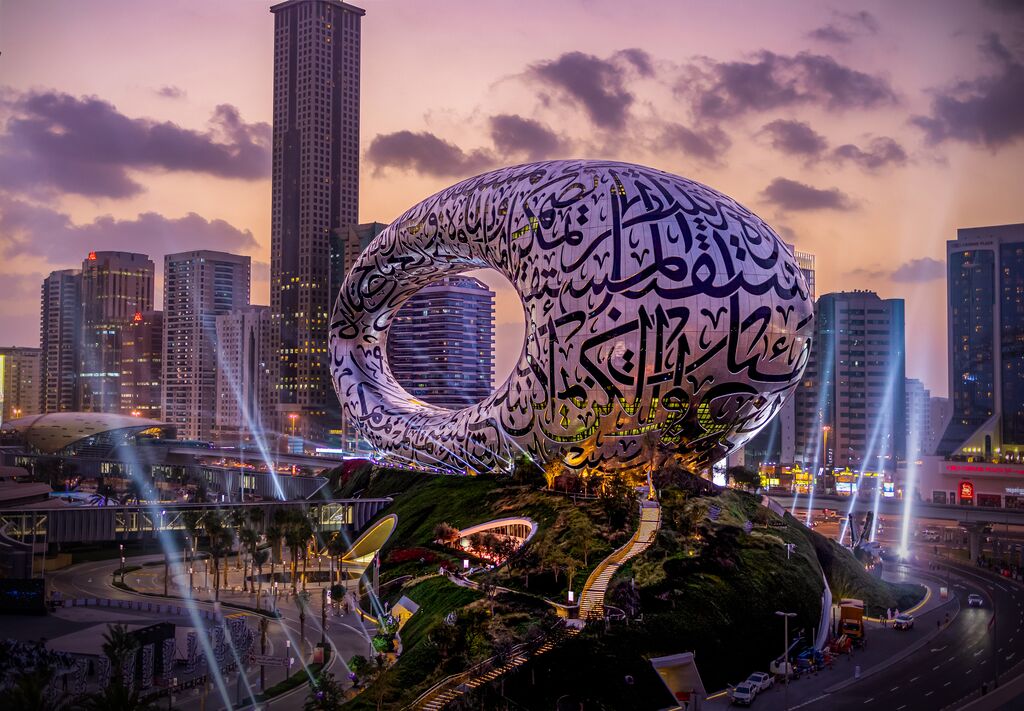When the UAE government set course for the future to be the world’s leading country with its Centennial Plan 2071, Dubai was already well prepared for the task. With a plan to invest and build around the four essential aspects of education, economy, government development and community cohesion, the emirate is cultivating an environment for exponential growth with knowledge at its core. From space research to tackling climate change and from robotics to food solutions, Dubai is digging deep to present initiatives which align with a sustainable future for all and its ambitious vision to make a big impact.
To support this, in September His Highness Sheikh Hamdan bin Mohammed bin Rashid Al Maktoum, Crown Prince of Dubai and Chairman of the Executive Council, launched the Dubai Research and Development (R&D) Program. Its goal is to support key economic sectors and create new opportunities for growth by providing a comprehensive framework for research, development, and innovation across the emirate. Boosting scientific and technological research will help Dubai advance in existing sectors as well as identify the potential of new ones.
Robotics & Artificial Intelligence Take the Lead
Stressing the importance of the diversification of Dubai’s future economy, the government is placing strong focus on the development of Artificial Intelligence (AI) and Robotics. Earlier this year, Dubai Future Foundation announced the launch of the ‘Dubai Robotics and Automation (R&A) Program’ to boost the development, testing and adoption of R&A, and accelerate the use of its application in key economic sectors. As part of the Program, 200,000 robots will be provided over the next 10 years to increase efficiency and productivity in various sectors including services, logistics, and the industrial sector.
A major application of such advancements is Dubai’s recently founded first robotic biobank. Set to open in 2023 with a capacity to manage seven million specimens, the biobank will be one of the world’s largest in terms of sample capacity. A robotic system will ensure biological samples are secured in cryogenic storage (below 80 degree Celsius) maintaining proper sample integrity and retrieval.
In transportation, AI is taking the driver’s seat. An agreement signed between the Roads and Transport Authority (RTA) and Cruise (an autonomous vehicle company) is already mapping the city digitally with two electric vehicles. The aim is to offer self-driving taxi and e-Hail services in Dubai in limited numbers by 2023 and gradually to reach up to 4000 vehicles by 2030 in the hope to facilitate mobility, ease city congestion, and boost road traffic safety levels.
Projects of this sort fall under the UAE’s ‘Strategy for Artificial Intelligence’, launched already in 2017. A first of its kind in the region, the strategy covers most economic sectors and creates a platform to help advance and integrate AI in the country for better quality of life on all levels.
Tackling Climate & Food Challenges
UAE government is committed to agriculture and rural development and food security. The country has developed a comprehensive national food security strategy to position it as number one in the Global Food Security Index by 2051 by promoting increased resilience and sustainable food production.
With a priority to apply modern farming techniques to accelerate self-sufficiency in fresh food produce, Dubai has opened Bustanica, the world’s largest vertical farm. Located near the airport, the hydroponic farm is geared to produce more than 1,000,000 kilograms of high-quality leafy greens annually while requiring 95% less water than conventional agriculture.
Under the UAE Net Zero by 2050 strategic initiative, a national drive to achieve net-zero emissions by 2050, Dubai is investing heavily in clean and renewable energy. The Green Hydrogen project invites the private sector and global investors and developers to participate in the production of green hydrogen, the ‘fuel of the future’. With production predicted to increase by 57% annually, the project at the Mohammed bin Rashid Al Maktoum Solar Park supports the UAE’s leadership and competitiveness in green hydrogen markets.
Into Space
To strengthen its commitment to the Paris Climate Agreement, the Mohammed Bin Rashid Space Centre (MBRSC) has joined this year the Space Climate Observatory (SCO) International, which coordinates worldwide efforts to accurately monitor the impact of climate change. Dubai’s DMSat-1 satellite launched in 2021 shares data on the UAE’s atmospheric aerosols and greenhouse gases and chemicals, contributing to the management of such emissions.
But Dubai’s space exploration goes beyond climate change on Earth. The Emirates Lunar Mission is set to explore the moon using the “Rashid Rover”, a vehicle equipped with the latest technologies and innovative devices. It will capture photos and collect information and data from the moon’s unexplored areas allowing the country to conduct comprehensive and integrated studies of how to build human settlement on the moon.
For more information on Dubai as a business events destination, contact askdbe@dubaidet.ae or visit www.dubaibusinessevents.com
 Museum of the Future, Dubai
Museum of the Future, Dubai